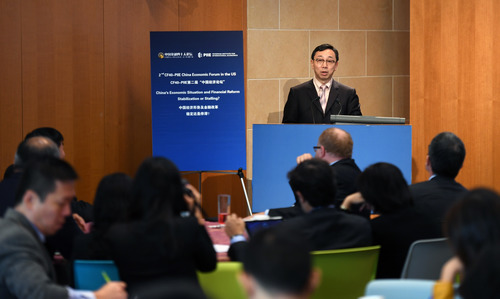WASHINGTON, Oct. 12 (Xinhua) - Countries around the world should work together to de-escalate current trade disputes and fix the global trade system instead of destroying it, Zhang Tao, deputy managing director of the International Monetary Fund (IMF), said in a recent interview with Xinhua.

Zhang Tao, deputy managing director of the International Monetary Fund (File Photo: Xinhua)
TRADE TENSIONS
In its updated World Economic Outlook (WEO) report released earlier this week, the IMF downgraded global growth forecasts for 2018 and 2019 to 3.7 percent from 3.9 percent estimated in July, citing of escalating trade tensions.
"It is concerning that some of the risks to the outlook that we previously identified have started to materialize. First and foremost are the trade tensions," Zhang told Xinhua.
"Tit-for-tat tariffs can have a negative economic impact by preventing trade from playing its crucial role in boosting productivity, spreading new technologies and reducing poverty," he said.
If all currently announced tariffs go into effect, global output could be reduced by more than 0.8 percent in 2020 from the baseline, according to a simulation in the WEO that looks at the impact of trade tensions on global economy.
"One of the immediate challenges is to de-escalate the current trade disputes," Zhang said, adding "we can best do this by working together and entering into constructive discussions," which could take place in a bilateral or multilateral setting.
The IMF official also called for countries working together to "fix and modernize the global trade system" to ensure more open and fair trade.
"This includes considering areas such as looking at the distortional effects of state subsidies, improving the enforcement of intellectual property rights, and taking steps to ensure effective competition. It also means unlocking the full potential of e-commerce and other tradeable services," he said.
"We should fix the system, not throw it out," Zhang argued, as the system of the trade rules established after World War II has nurtured unprecedented growth in the global economy and has helped lift hundreds of millions of people from poverty.
While trade and global interconnectedness have raised living standards around the world, "discontent has been rising" in many countries, especially the advanced economies, from both trade and technological change, according to Zhang.
"More must be done to mitigate the unwelcome side effects including rising income inequality and job losses in some countries," he said, noting governments can support workers with job search assistance, training, wage insurance and life-long learning.
EMERGING MARKETS
Emerging markets have experienced a broad tightening in financial conditions since early this year, as the U.S. Federal Reserve moves forward the plan to tighten its monetary policy.
The Federal Reserve has raised interest rates three times this year and is largely expected to hike once more before year-end.
"The ongoing tightening of monetary policy in the United States is exerting pressure on emerging markets. Over time, these conditions have the potential to expose financial vulnerabilities," Zhang said.
While most emerging markets have adjusted to the shifting financial conditions, some countries with weaker fundamentals are feeling headwinds because of country-specific factors, such as higher levels of debt and a higher share of dollar-denominated debt, according to the IMF official.
"Our advice is that emerging market and developing countries can strengthen their defenses against unexpected shocks by building fiscal buffers, adopting appropriate monetary policies, and allowing exchange rates to absorb some of the pressures if they experience capital outflows," he said.
FINANCIAL CRISIS
Reflecting on the 2008 global financial crisis, Zhang said "we are safer now than a decade ago," but "not safe enough."
In his view, many of the pre-crisis financial system vulnerabilities in banks, mortgage markets, and financial markets have been addressed. For example, bank capital and liquidity positions have improved and systemic banks are now subject to tighter regulatory standards and regular stress tests.
However, "the reforms are not complete, and there has been some backsliding," Zhang said, adding "we also have seen a shift of leverage-related risks to the nonfinancial sector and less regulated institutions."
"A core lesson from the crisis is the importance of vigilance. We can not be complacent about the vulnerabilities in our economies and financial systems," he said, warning those vulnerabilities can be amplified into threats to financial stability.
"And we have learned that we must always be attuned to new challenges and the vulnerabilities they may bring," he said, urging policy-makers to address the issues raised by regulatory arbitrage, fintech and cyber risks.
QUOTA REVIEW
The IMF Board of Governors has called on the Executive Board to complete the 15th general review of members' quotas by the 2019 Spring Meetings and no later than the 2019 Annual Meetings, according to Zhang.
"The quota review presents an opportunity to build on the major achievements of the 2010 Reforms, which, among other steps, significantly expanded the voice of emerging market countries like China in the Fund," he said.
The IMF decided to increase funding quotas in 2010. China has the third largest quota and voting share in the IMF after the United States and Japan, following the ratification of the IMF 2010 quota and governance reforms.
"One topic the Fund's membership is likely to address during the review is whether the total amount of resources and the balance between permanent and borrowed resources will meet future demands," Zhang said.
He believed that the IMF is "adequately resourced" at this point with a total lending capacity of about 1 trillion U.S. dollars, and more than three-quarters of these resources are available for new lending.


